| Srl | Item |
| 1 |
ID:
101650
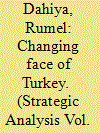

|
|
|
| 2 |
ID:
101656
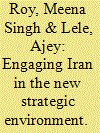

|
|
|
|
|
| Publication |
2011.
|
| Summary/Abstract |
In recent years, Iran has come to acquire a significant place in the West Asian region with the ability to influence regional politics. For India, relations with Iran are vital. In the changed strategic environment, both India and Iran have been working towards improving their bilateral relations. However, there are several challenges, especially for India, in this regard. If the Iran-US confrontation intensifies, for example, India may find it difficult to pursue a smooth relationship with Iran. This article looks at various facets of India-Iran relations and examines the opportunities and challenges that lie ahead.
|
|
|
|
|
|
|
|
|
|
|
|
|
|
|
|
| 3 |
ID:
101657
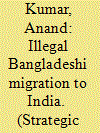

|
|
|
|
|
| Publication |
2011.
|
| Summary/Abstract |
Migration, a worldwide phenomenon, has often been seen as beneficial for both the sending and receiving countries. However, post-9/11, the phenomenon is seen as a mixed blessing. It is also being realised that it is impossible to check illegal migration unless the sending country cooperates. In South Asia, India has been at the receiving end of the problem of illegal immigration from Bangladesh. This paper argues that such illegal migration is posing a threat to internal security because the issue has not been properly securitised. Migrants seem to have successfully bypassed legal hurdles, which has kept certain territories out of reach even for Indian nationals. If Bangladesh's internal politics and economic deprivation are major factors for this state of affairs, then permissiveness towards illegal immigration in Indian political circles is also responsible. The largely lenient political class has been prompted to take a close look at the issue as an increasing number of Bangladeshis have of late been found to be involved in terror activities.
|
|
|
|
|
|
|
|
|
|
|
|
|
|
|
|
| 4 |
ID:
101653
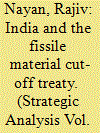

|
|
|
|
|
| Publication |
2011.
|
| Summary/Abstract |
The international community inside and outside the Conference of Disarmament is underscoring the need for concluding a fissile material cut-off treaty (FMCT). The Indian government, for a long period, has been sponsoring the idea. Notwithstanding the international stagnation, the issue has been instigating periodic debate in India on the Indian approach. The periodic revival of the issue requires that India revisit its policy on fissile material production as well as its approach towards a possible FMCT. This article examines the question: should India's approach to conclude an FMCT be within the UN institutional framework? The new international reality is pushing for a new context, new realignments and a fresh outlook for an FMCT. India should take its own time to support conclusion of an FMCT so that its national interests and security are not adversely affected.
|
|
|
|
|
|
|
|
|
|
|
|
|
|
|
|
| 5 |
ID:
101658
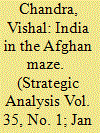

|
|
|
| 6 |
ID:
101655
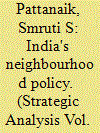

|
|
|
|
|
| Publication |
2011.
|
| Summary/Abstract |
Security has been a major driving force of India's neighbourhood policy. India's sympathies with democratic forces and its aversion to extra-regional presence are all geared to optimise its security interest, which is ensconced in its principal belief of a stable neighbourhood while engaging in a mutually beneficial relationship. Within this broad framework, this paper attempts to study Bangladesh's reaction to these parameters of India's neighbourhood policy. The paper argues that some Bangladeshi perceptions are shaped by regimes and vested interests, who perceived India as the ideological 'other'. While engaging across the political spectrum, India therefore needs to pursue policies that connect it with the people of Bangladesh and are beyond partisan politics determined by regime interests.
Relationship with foreign countries is a very intricate and very difficult business dealing with the psychology of human beings, the psychology of nations, involving consideration of their background and culture, language and so on. (Jawaharlal Nehru)
India seeks to build a new future with Bangladesh. The time has come to chart a new path. We are ready to pursue a bold Vision for our relations, based on mutual respect and benefit. (Manmohan Singh, January 2010)
|
|
|
|
|
|
|
|
|
|
|
|
|
|
|
|
| 7 |
ID:
101659
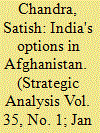

|
|
|
| 8 |
ID:
101660


|
|
|
| 9 |
ID:
101649
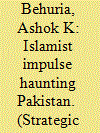

|
|
|
| 10 |
ID:
101648


|
|
|
| 11 |
ID:
101647


|
|
|
| 12 |
ID:
101654
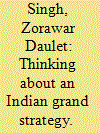

|
|
|
|
|
| Publication |
2011.
|
| Summary/Abstract |
This article is primarily a conceptual overview on the theme of a grand strategy for a rising power such as India. The objective is to promote a systematic and structural way of thinking on grand strategy-the dynamic art of relating ends and means. The author identifies and expounds on the major domestic and international variables that will shape India's grand strategy. Factors such as national ethos, domestic political economy, geopolitical context, nature of economic interdependence, the impact of the nuclear revolution, and the evolving structure of the international system all influence the environment in which Indian power is deployed. The author not only contextualises the impact of these variables but also offers select strategic responses to these multiple factors that will circumscribe an Indian grand strategy.
|
|
|
|
|
|
|
|
|
|
|
|
|
|
|
|
| 13 |
ID:
101651


|
|
|
| 14 |
ID:
101661
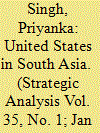

|
|
|
| 15 |
ID:
101652


|
|
|